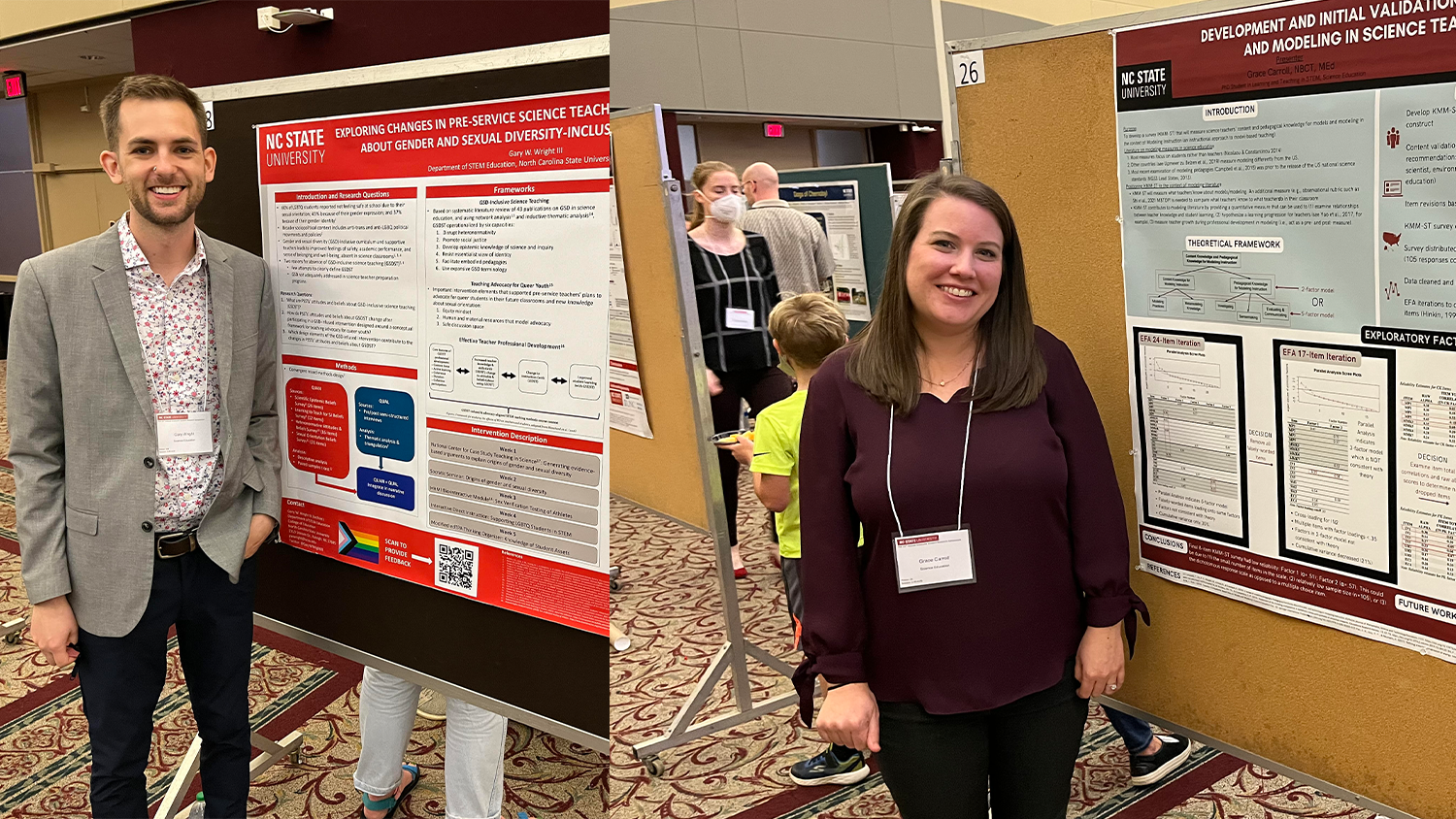Research from College of Education Doctoral Students Gary Wright and Grace Carroll Recognized at NC State’s Graduate Student Research Symposium

When Gary Wright ’18MED, ’22PHD, a doctoral student in the NC State College of Education’s Ph.D. in Learning and Teaching in STEM science education program area of study, first approached his advisor with his decision to explore gender and sexual diversity in his dissertation, he had a lingering feeling of uncertainty about integrating this aspect of his personal identity into his research.
His worries, he said, were unfounded as he has received “overwhelming support and encouragement” from his College of Education peers and faculty since embarking on his scholarly journey. Now, his research has been honored with the first place prize in the education category of NC State’s 15th Annual Graduate Student Research Symposium.
“Being nominated to present at the Research Symposium and selected as a first-place winner for the College of Education validates the importance and necessity of this work and centering LGBTQ identities within STEM education,” Wright said. “Having the opportunity to share this work with brilliant scholars from a variety of disciplines, and being recognized for the work, will also hopefully set the stage for more exciting and powerful equity-based research here at NC State.”
Wright’s research presentation, entitled “Queering Science Teacher Education: Exploring Changes in Pre-Service Science Teachers’ Attitudes and Beliefs About Gender and Sexual Diversity-Inclusive Science Teaching,” explores how pre-service science teachers’ attitudes about gender and sexual diversity (GSD) changed after participating in a GSD-infused intervention that was implemented in a STEM teaching methods course.
Data showed that the intervention had medium positive effects on pre-service science teachers’ heteronormative attitudes and beliefs and that the pre-service teachers felt that the intervention provided them with concrete examples of gender and sexual diversity inclusive science teaching that were compatable with ambitious science teaching and multicultural education efforts focused on science content.
Wright said his line of research has been directly influenced by his own positionality as an openly queer educator and his first-hand experiences in classrooms that were not culturally neutral spaces. His research, he said, will help contribute to a more nuanced understanding of how to prepare future science teachers to address gender and sexual diversity in their classrooms and to better meet the needs of all students.
“This work is personal for me because it is my hope that my research will improve instruction and ensure that all students have a space to learn in ways I wish were present for me within the schools I attended,” he said.
Doctoral Student Grace Carroll Wins 3rd Place Prize at Research Symposium
Grace Carroll ‘11, ’21MED, ’23PHD, a doctoral student in the Ph.D. in Learning and Teaching in STEM science education program area of study, was also recognized for her research at the Graduate Research Symposium.
Carroll won the third place prize in the education category for her presentation, entitled “Development and Initial Validation of the Knowledge of Models and Modeling in Science Teaching (KMM-ST) Survey.”
“I was so grateful to have been given the opportunity to present the work that I am so passionate about. It gives me confidence that my work is valuable and needed in my field,” she said. “Oftentimes, research can feel like you’re ‘down in the weeds,’ but having the symposium outlet to share that hard work, and for that work to be recognized, means I was able to articulate why it matters. If I can provide valuable insights for other scholars in my field and for education in general, then it is all worth it.”
Carroll’s study focused on the development and validation of the Knowledge of Models and Modeling in Science Teaching survey to measure teacher knowledge necessary to use models and modeling to promote students’ science learning. Once the survey establishes sufficient evidence for reliability and validity, it will serve as a research tool for studies examining links between teacher knowledge and practice and student learning outcomes related to models and modeling in science classrooms.
Carroll said she has been interested in the intersection of scientific modeling and science teaching since participating in professional development related to modeling as a high school science teacher. She now has the opportunity to help deliver the exact same professional development program she once attended to teachers in rural parts of Western North Carolina through her role as a research assistant on a project led by Professor of Science Education Soonhye Park.
“To see this work from the other side, as a researcher, has been invaluable,” Carroll said. “We are currently working with some teachers who will become mentors for newly trained teachers. To watch these mentors in action, transforming curriculum to meet the needs of their students, has given me life.”
Modeling, Carroll said, is a useful tool to help students explore science phenomena, make sense of tricky concepts and communicate complex ideas. However, more research is needed to help teachers to be able to support students through the process.
“I wanted to figure out a way to be able to quantitatively examine teachers’ content knowledge of models and modeling, as well as their pedagogical knowledge of models and modeling,” Carroll said. “Once we have a quantitative measure for this, we can better investigate the effectiveness of professional developments that support teachers in modeling curricula. We can examine correlations between what teachers know and what they do in their classrooms, how epistemic beliefs about science play into these constructs and how all of this impacts student learning with models.”
- Categories:


